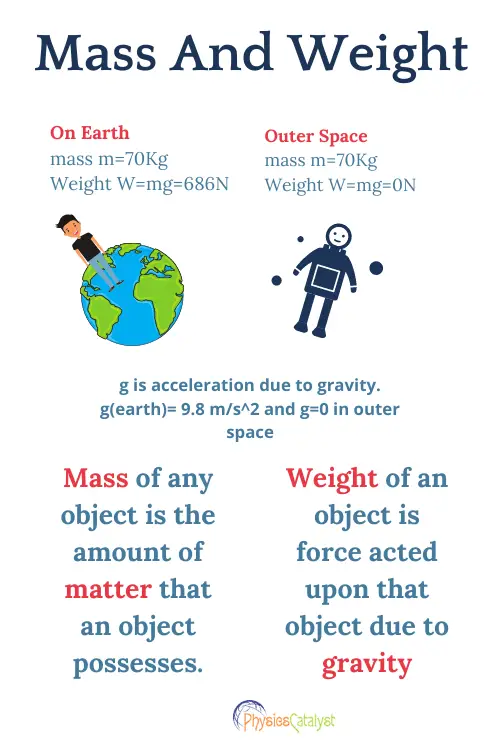
Mass Vs. Weight Comparing and Understanding differences
Mass and weight, most of the time both physical quantities are used interchangeably in our day-to-day life. People mix them up most of the time, but both these quantities are not the same.
The basic difference between weight and mass is that mass is the amount of matter that an object possesses whereas the weight (\(W=m\times g\)) of an object is force acted upon that object due to gravity
So, here in this article, we shall look at the difference between mass and weight, and as a physics students, we must pledge together not to make this sloppy mistake again at least not while solving physics problems. We will compare both these physical quantities and understand the difference between them. When studying physics, we must be aware of the clear distinction between these two quantities.

Why we get confused?
There is a reason why people so often get confused between mass and weight. You might have observed people saying
“My weight is 70 Kg”
But this statement is not technically correct because weight is the force of gravity on any person’s mass. Here we are using a unit of mass with weight in the above statement. Here 70 Kg is the mass that you have in your body.
So, if a person of 70Kg wants to know his weight then he would have to calculate it using equation \(W=mg\). So,
Weight \(W=mg=70Kg \times 9.8 m/s^2 = 686 Kg m/s^2=686N\)
\(Kg m/s^2\) is also written as \(N\).
So, in saying 70 Kg weight, the term weight we so casually use is not our weight, but mass contained in our body. Here you can see that mass and weight are confused because the measure of the quantity of matter in things (mass) is done by their gravitational attraction to earth (weight).
Difference between mass and weight
- The term mass is used for how much matter an object under consideration has. Mass is the measure of the inertia of an object. Weight is the most familiar force acting on an object that is the force of gravitation acting on objects by Earth.
- The mass contained in a body is denoted by letter \(M\) or \(m\) whereas the weight of a body is denoted by letter \(W\) and can be calculated by relation \[W=mg\] where \(m\) is mass of the body and \(g=9.8m/s^2\) is the acceleration due to the gravity of Earth.
- The weight of a body can be zero at places where there is no gravity. The mass of an object can never be zero.
- Mass of a body always remains the same, but we cannot say the same thing about the weight of a body. The weight of the body also changes with a change in location. For example, acceleration due to gravity on the Moon’s surface is less than the acceleration due to gravity on the surface of Earth. So, the weight of an object on the surface of the moon would be less than the weight of the same object on the surface of Earth.
- Mass is a scalar quantity as it has magnitude only but no direction. Weight on the other hand is a vector quantity and it has both magnitude and direction. The weight of anybody on Earth’s surface is directed towards the center of the Earth.
- The mass may be measured using an ordinary balance, but weight is measured using a spring balance.
- Mass is a fundamental quantity whereas weight is a derived quantity because it depends on other physical quantities for defining it,
- Mass is measured in grams or kilograms whereas weight is measured in Newton (N) which is a unit of force.
Mass Vs. Weight in tabular form
| Mass | Weight |
| The measure of the amount of matter in a body | Force acting on mass because of acceleration due to gravity |
| Symbol is \(M\) or \(m\) | Symbol is W |
| Mass is always constant for a body. It does not depend upon the value of gravity which might be different at different places. | Weight is dependent on gravity \(W=mg\). It varies from place to place. Weight can be zero in places where there is no gravity. |
| Mass is a fundamental quantity. It has magnitude but no direction. So, it is a scalar quantity | Weight is a derived quantity (\(W=mg\)). Weight has both magnitude and direction which points towards the center of gravity. So, it is a vector quantity. |
| The SI unit of mass is Kilogram (Kg). | The SI unit of weight is Newton (N) or (Kgf). |